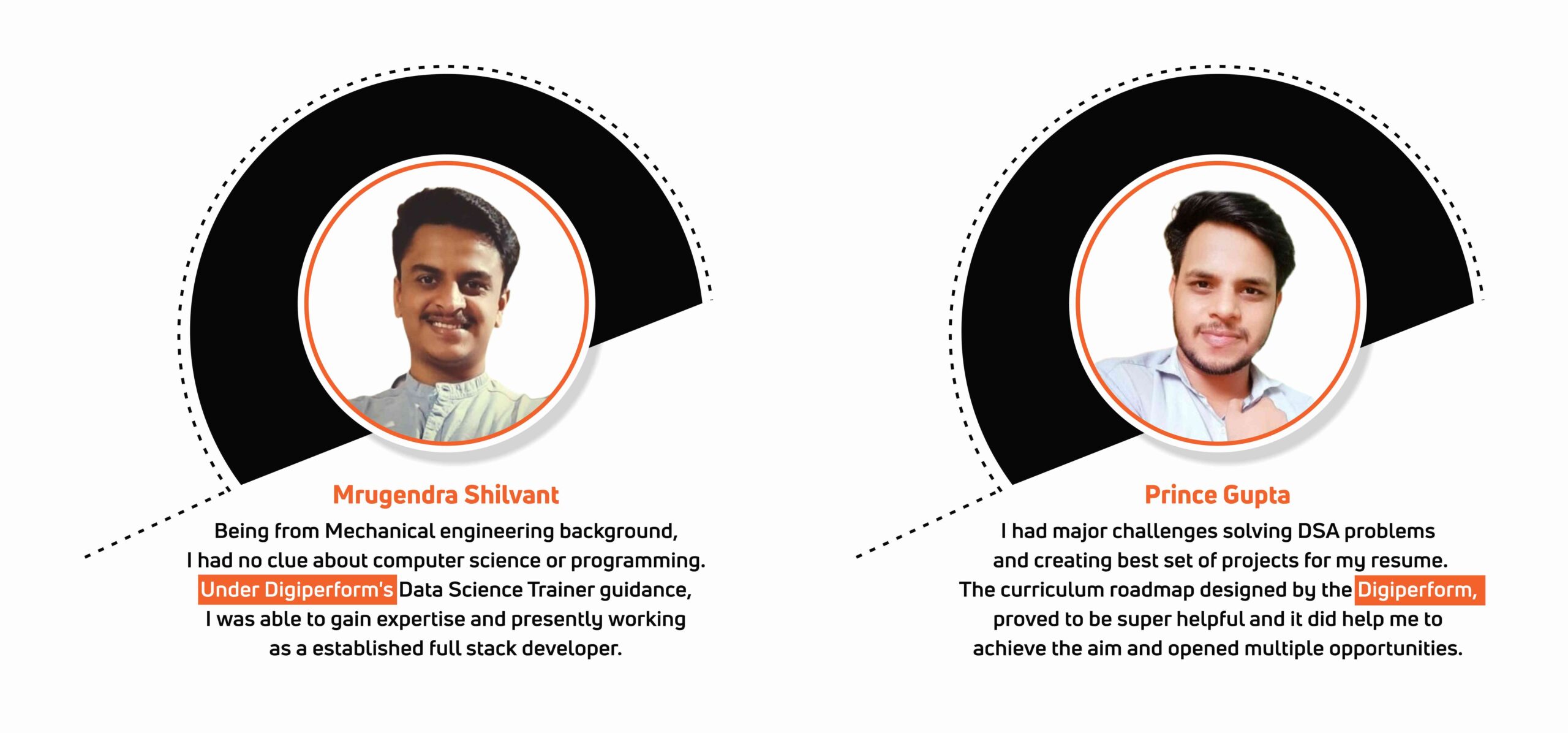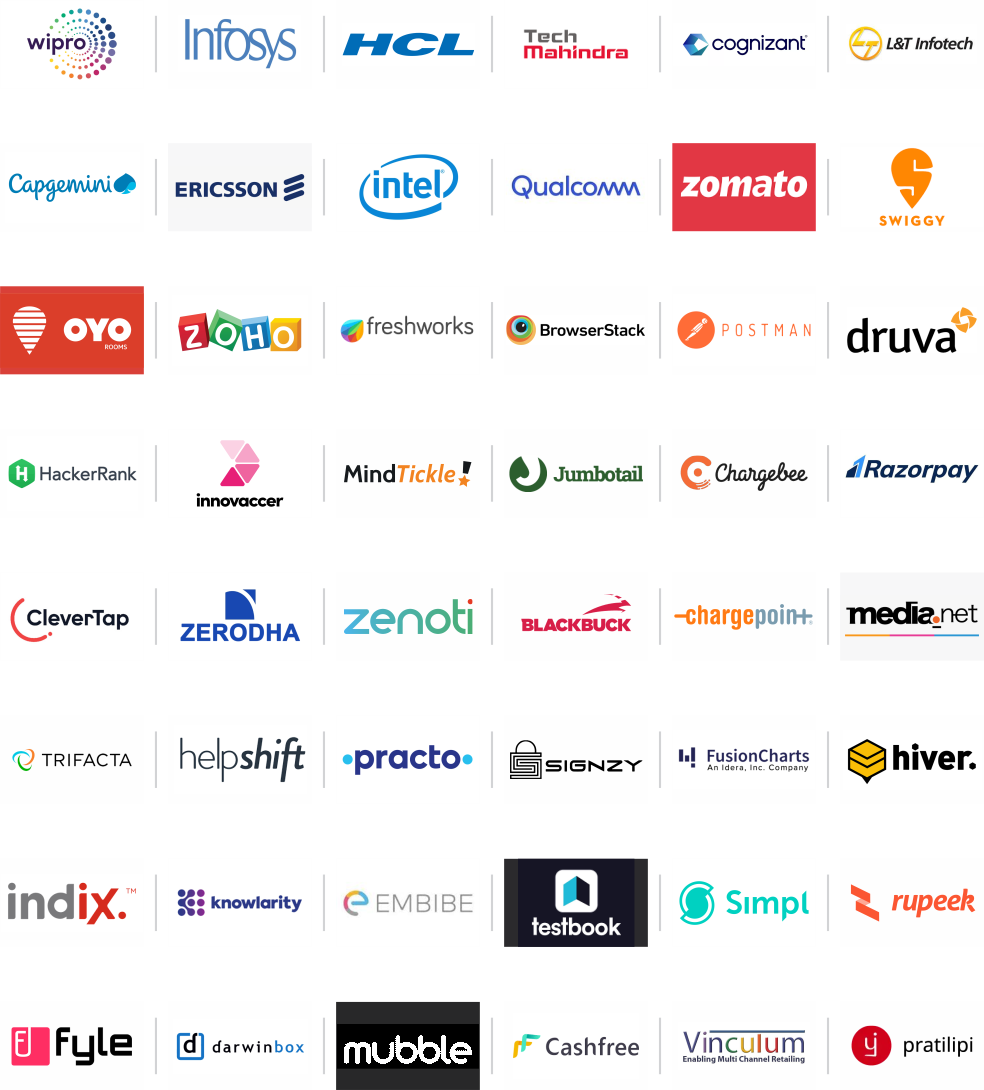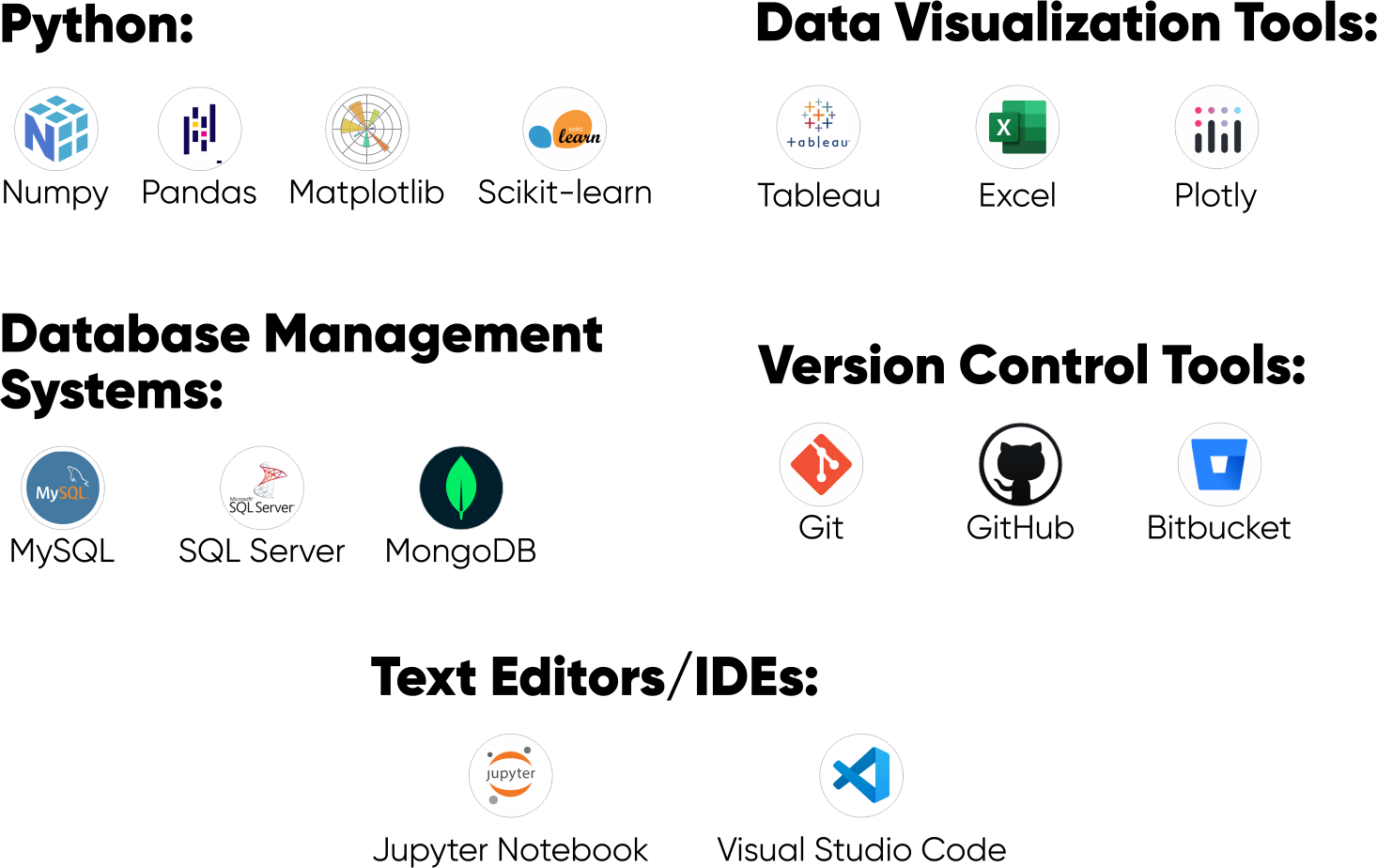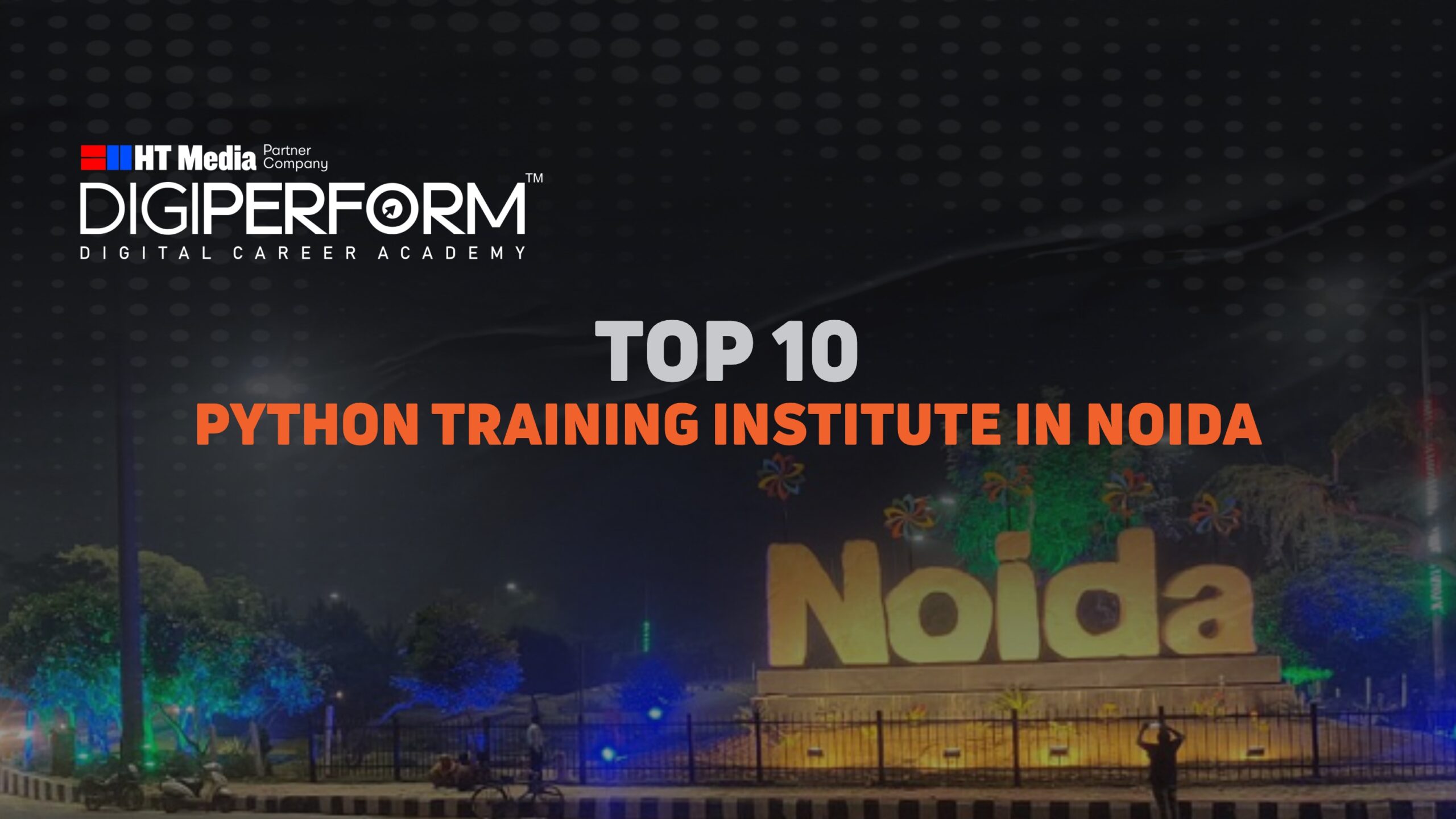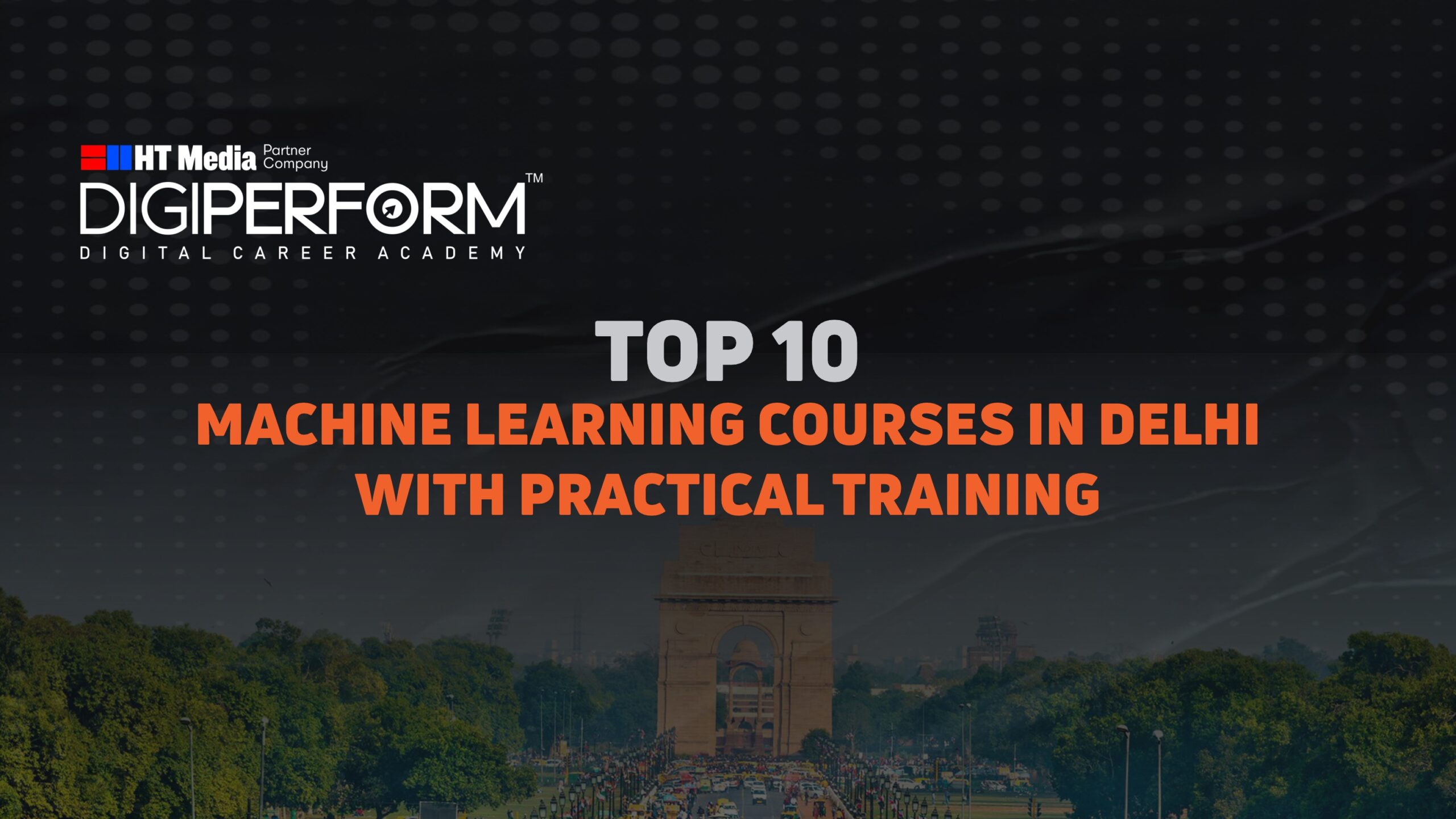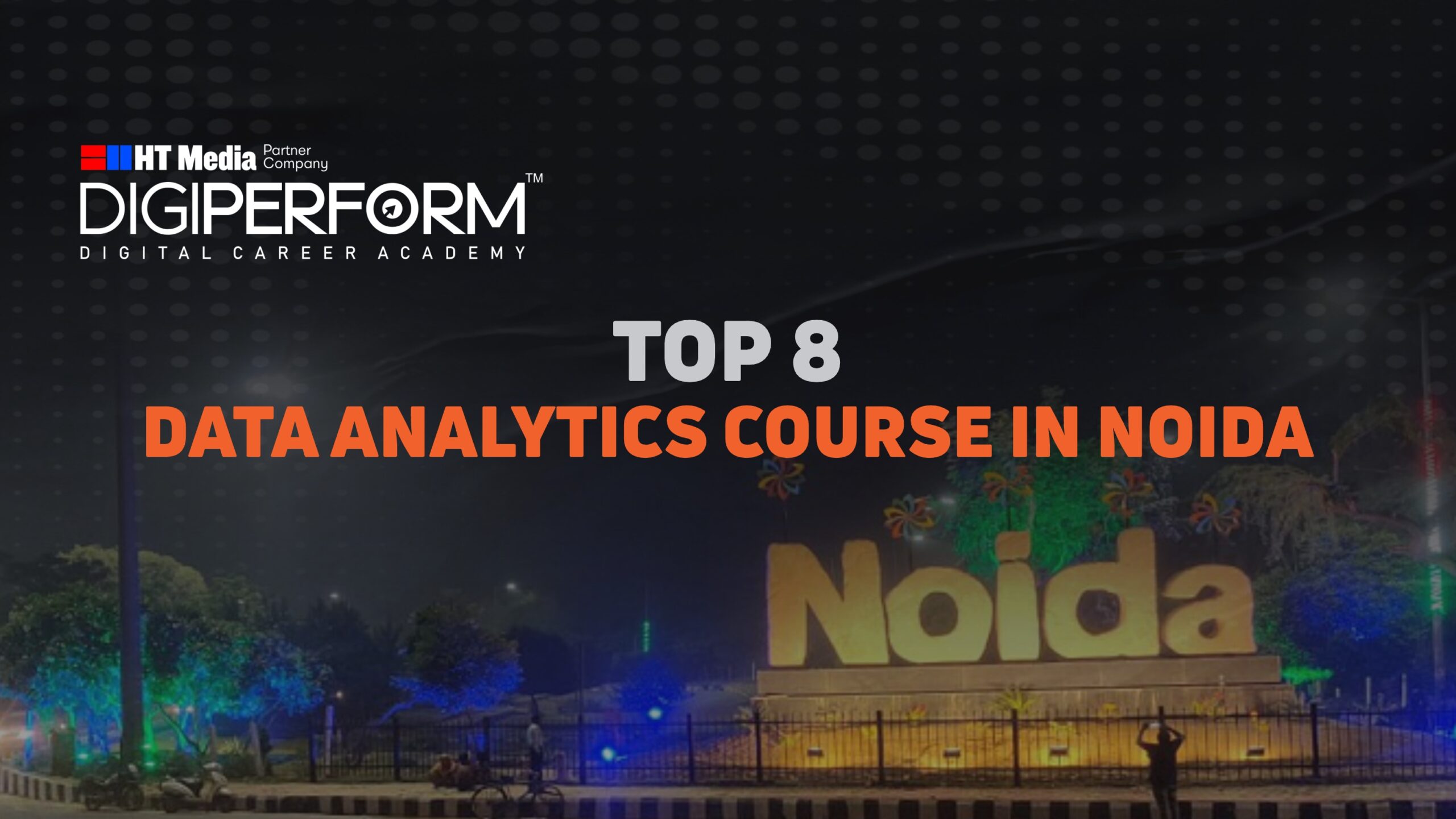Master
Data Science Courses In Lucknow
India’s Only Data Science Training Program created to help you to build a successful career in Data Science from scratch.
Top 8 Data Science Courses in Lucknow with Placements
In the vibrant city of Lucknow, the demand for skilled professionals in the evolving field of Data Science has spurred the emergence of cutting-edge Data Science Training Program. As organizations increasingly harness the power of data to drive decision-making, the need for individuals equipped with advanced analytical skills has become paramount. Lucknow, with its rich blend of tradition and modernity, has become a hub for educational excellence, and the city’s Data Science courses seamlessly integrate this ethos.
Lucknow’s Data Science courses not only offer a comprehensive understanding of statistical analysis, machine learning, and data visualization but also cater to the unique needs of the local industry. With a curriculum designed to address real-world challenges prevalent in the Lucknow business landscape, students gain practical insights and skills that are directly applicable in the regional job market. The courses leverage the city’s growing technological infrastructure and foster a collaborative learning environment, ensuring that graduates are well-prepared to contribute meaningfully to the data-driven landscape of Lucknow and beyond.
Comparison Chart: Top 8 Data Science Courses in Lucknow with Placement.
If you are looking for the best and most reliable information regarding Data Science courses in Lucknow, then you have come to the right place.
| Institute Rank | Name | Training Delivery Type | Offering Course Since | Fees | Placement Assistance |
| 1 | Digiperform- Digital Career Academy | Online & Offline | 2013 | INR 30k-90k | Yes |
| 2 | Escalera Technologies | Offline | 2019 | Na | Yes |
| 3 | StarAgile | Offline | 2016 | 13999 | Yes |
| 4 | Edvancer | Online | 2013 | 24,995 – 29,995 | Yes |
| 5 | IIM SKILLS | Online | 2015 | 49,900 | Yes |
| 6 | 360 DigiTMG | Online | 2013 | ₹1,85,000 | Yes |
| 7 | Imarticus Learning | Online/Offline | 2012 | 2,25,000 | Yes |
| 8 | DataMites | Online | Na | 20,895-48,195 | Yes |
What is Data Science and its Importance?
Data Science is a multidisciplinary field that involves extracting insights and knowledge from structured and unstructured data. It combines techniques from statistics, mathematics, computer science, and domain-specific expertise to analyze data and make informed decisions.
Importance of Data Science
Informed Decision-Making: Data Science empowers organizations to make data-driven decisions. By analyzing large datasets, businesses can gain valuable insights that guide strategic planning and operations.
Predictive Analytics: Data Science enables the use of predictive modeling and machine learning algorithms to forecast future trends and outcomes. This predictive capability aids in proactive decision-making and planning.
Business Optimization: Through the analysis of data, businesses can identify inefficiencies, optimize processes, and enhance overall performance. This leads to improved resource allocation and cost-effectiveness.
Personalization: Data Science plays a crucial role in creating personalized experiences for users. Whether in e-commerce, entertainment, or social media, understanding user behavior allows for tailored recommendations and services.
Fraud Detection and Security: Data Science is instrumental in developing robust security measures and fraud detection systems. By analyzing patterns and anomalies in data, organizations can identify and mitigate potential security threats.
Healthcare Advancements: In the healthcare sector, Data Science contributes to personalized medicine, disease prediction, and treatment optimization. Analyzing patient data helps healthcare professionals make more precise diagnoses and recommend tailored treatments.
Scientific Research: Data Science is extensively used in scientific research to analyze complex datasets, simulate experiments, and draw meaningful conclusions. It accelerates the pace of discovery across various scientific disciplines.
Customer Insights: Understanding customer behavior through data analysis allows businesses to tailor their products and services to meet customer preferences. This enhances customer satisfaction and loyalty.
Top 8 Data Science Courses in Lucknow
1. Digiperform
Digiperform stands out as India’s largest training provider, specializing in digital skills. Our comprehensive course curriculum is meticulously crafted by a team of over 50 experts hailing from the Data Science industry. We actively seek input and suggestions from 450 innovative businesses across Asia to ensure our courses stay ahead of industry trends.
Our curriculum is thoughtfully designed to encompass the skills required for roles in both small and large Data Science agencies, as well as companies with in-house Data Science teams. At Digiperform, we prioritize a hands-on learning approach, combining practical exercises, research, and assignments to provide you with a well-rounded and practical learning experience.
Why Choose Digiperform Online Data Science Course?
Are you ready to embark on a transformative journey into the world of data science? Digiperform brings you a comprehensive online data science course designed to empower you with the skills and knowledge needed in today’s data-driven landscape. Here’s why choosing Digiperform’s online data science course is the key to unlocking your potential:
Industry-Relevant Curriculum: Dive deep into a curriculum crafted by industry experts, ensuring that you acquire the most relevant and up-to-date skills demanded by today’s employers.
Hands-On Learning Experience: Learn by doing! Our course emphasizes hands-on projects and practical applications, allowing you to build a robust portfolio that showcases your expertise to future employers.
Flexibility and Convenience: Life is busy, and we understand that. Our online data science training program offers flexibility, allowing you to learn at your own pace and schedule. Access course materials anytime, anywhere, and tailor your learning journey to fit your lifestyle.
Expert Guidance: Benefit from the guidance of industry-experienced instructors who are passionate about your success. Get personalized feedback, support, and insights that go beyond the textbooks.
Real-World Applications: Bridge the gap between theory and practice by working on real-world data science projects. Gain valuable experience tackling challenges that mirror those faced by professionals in the field.
Career Assistance: Your success is our priority. Receive dedicated career support, including resume building, interview preparation, and job placement assistance. We’re committed to helping you launch a rewarding career in data science.
Community Support: Join a vibrant community of learners where you can collaborate, share insights, and network. Connect with peers, industry professionals, and mentors who are passionate about data science.
Certification of Excellence: Upon completion of the course, receive a certification that signifies your mastery of data science concepts. Stand out in the competitive job market with a credential that reflects your dedication and expertise.
Data Science Online Course: Advantages
Embarking on a journey to master data science training program with Digiperform’s online course opens up a world of advantages that can reshape your career trajectory. Here’s why choosing our Data Science Online Course is the key to unlocking unparalleled opportunities:
Comprehensive Curriculum: Digiperform’s online course is crafted by industry experts to ensure a comprehensive coverage of key data science concepts, methodologies, and tools. Stay ahead with a curriculum designed to meet the demands of the evolving data landscape.
Flexibility in Learning: Life is dynamic, and so is your learning journey. Our online course provides the flexibility to study at your own pace, enabling you to balance your professional and personal commitments while acquiring valuable data science skills.
Hands-On Practical Experience: Theory meets practice with hands-on projects designed to simulate real-world scenarios. Gain practical experience in applying data science techniques, ensuring you are ready to tackle challenges in professional settings.
Expert-Led Instruction: Learn from seasoned industry professionals who bring their expertise and insights into the virtual classroom. Benefit from expert-led instruction, personalized guidance, and mentorship to accelerate your learning curve.
Industry-Relevant Tools and Technologies: Stay at the forefront of the industry by mastering the latest tools and technologies used in data science. Digiperform’s course ensures you are well-versed in the tools that employers seek, enhancing your employability.
Networking Opportunities: Join a vibrant community of learners, alumni, and industry professionals. Network, collaborate, and exchange ideas to broaden your perspective and stay connected with the pulse of the data science community.
Career-Focused Support: Your career success is our priority. Benefit from dedicated career support services, including resume building, interview preparation, and job placement assistance. We’re committed to guiding you toward a rewarding career in data science.
Globally Recognized Certification: Earn a certification upon course completion that is globally recognized. Showcase your proficiency in data science to prospective employers, positioning yourself as a highly qualified and capable professional.
Continuous Learning and Updates: The field of data science is ever-evolving. Our course is designed to instill a mindset of continuous learning, keeping you updated on the latest advancements and ensuring your skills remain relevant.
Future-Proof Your Career: Data science is the cornerstone of future industries. By enrolling in Digiperform’s online course, you are future-proofing your career, equipping yourself with skills that are increasingly vital across diverse sectors.
Data Science Course Syllabus
Module 1: Introduction to Data Science | Introduction to the Industry & Buzzwords Industrial application of data science Introduction to different Data Science Techniques Important Software & Tools Career paths & growth in data science |
Module 2: Introduction to Excel
| Introduction to Excel- Interface, Sorting & Filtering,
Excel Reporting- Basic & Conditional Formatting
Essential Excel Formulae
Layouts, Printing and Securing Files |
Module 3: Introduction to Stats
| Introduction to Statistics & It’s Applications Different types of Data Population vs Sample Sampling Techniques Intro: Inferential vs. descriptive statistics |
Module 4: Descriptive Stats Using Excel Datasets | Categorical Variables Visualization Using Excel Charts- FDT, Pie Charts, Bar Charts & Pareto Numerical Variables Visualization of Frequency & Absolute Frequency- Using Histogram, Cross Table & Scatter Plot Measure of Spread ( Mean, Mode , Median) Measure of Variance( Skewness, SD, Variance, Range, Coef. Of Variance, Bivariate Analysis, Covariance & Correlation) |
Module 5: Inferential Stats Using Excel Datasets | Introduction to Probability Permutation & Combinations Types of events Normal distribution Standard Normal distribution Normal vs. Standard Normal distribution Confidence Intervals & Z-Score Hypothesis Testing & It’s Types |
Module 6: Database Design & MySQL | Relational Database theory & Introduction to SQL MySQL Installation Database Creation in the MySQL Workbench Querying in MySQL Joins and Set Operations SQL Practice Case Study Window Functions Case Statements, Stored Routines and Cursors Ø Query Optimisation and Best Practices Ø Problem-Solving Using SQL |
Module 7: Data Visualization Using Advanced Excel
| Introduction LOOKUP functions Pivot Tables WHATIF Analysis Dashboard Creation Recording Macros Advanced Visualizations- PIVOT Charts, Sparklines, Waterfall Charts Data Analysis ToolPak – Regression in Excel |
Module 8: Data Visualization Using Tableau | Introduction to Tableau Introduction What is Data Analytics? Why Data Visualisation? What is Tableau? Why Tableau? Tableau vs Excel and PowerBI Exploratory and Explanatory Analysis Getting started with Tableau Visualizing and Analyzing data with Tableau – I Introduction Bar Charts Line Charts and Filters Area Charts Box plots and Pivoting Maps and Hierarchies Pie Charts Treemaps and Grouping Dashboards Visualizing and Analyzing Data with Tableau – II Introduction Joins and Splits Numeric and String functions Logical and Date functions Histograms and parameters Scatter Plots Dual Axis Charts Top N Parameters and Calculated Fields Stacked bar Charts Dashboards – II and Filter Actions Storytelling Summary |
Module 9: Python Programming
| Installing Anaconda & Basics of Python Introduction to programming languages Compiler vs Interpreter Getting Started With Python Introduction to jupyter Notebooks Identifiers, Keywords Print function Comment, Indentation Data Types Functions Understanding what are functions Defining and calling functions Local and global variables Different types of arguments Map,reduce,filter,lambda and recursive functions Data Structures in Python Introduction Lists Tuples Sets Dictionaries Practice Exercise Summary Operator Input and Output Different Arithmetic , logical and Relational operators Input, Output function Eval function Format Function Control Flow If elif else statement For and while loops Break , continue and Pass statement List and dictionary comprehensions Functions Understanding what are functions Defining and calling functions Local and global variables Different types of arguments Map,reduce,filter,lambda and recursive functions File Handling Purpose of file handling Different function in file handling (open,read, write,close) Different modes (r,w,a,r+,w+,a+) With block Exception Handling, OOPX & Regex What is exception handling Try, except, else and finally block Different types of Exception Concept of Oops Different functions in Regex Metacharacters in Regex |
Module 10: Python For Data Science | NumPy Introduction to NumPy Basics of NumPy Operations Over 1-D Arrays Practice Exercise I Multidimensional Arrays Creating NumPy Arrays Mathematical Operations on NumPy Mathematical Operations on NumPy II Computation Times in NumPy vs Python Lists Practice Exercise II Pandas Introduction to Pandas Basics of Pandas Pandas – Rows and Columns Describing Data Indexing and Slicing Operations on Dataframes Groupby and Aggregate Functions Merging DataFrames Pivot Tables Practice Exercise |
Module 11: Data Visualization Using Python- Matplotlib & Seaborn
| Introduction to Data Visualisation with Matplotlib Introduction to Matplotlib The Necessity of Data Visualisation Visualisations – Some Examples Facts and Dimensions Bar Graph Scatter Plot Line Graph and Histogram Subplots Choosing Plot Types Summary Data Visualisation: Case Study Introduction Case Study: Mind Map Case Study Overview Data Handling and Cleaning: I Data Handling and Cleaning: II Sanity Checks Outliers Analysis with Boxplots Histograms Summary Practice Questions Data Visualization with Seaborn Introduction Distribution Plots Styling Options Pie – Chart and Bar Chart Scatter Plots Pair Plots Revisiting Bar Graphs and Box Plots Heatmaps Line Charts Stacked Bar Charts Case Study Summary Plotly Practice Questions |
Module 12: Exploratory Data Analysis | Data Sourcing Module Introduction Introduction to EDA Public and Private Data Private Data Public Data Web Scraping-I Web Scraping-II Summary Data Cleaning Introduction Data Types Fixing the Rows and Columns Impute/Remove Missing Values Handling Outliers Standardising Values Fixing Invalid Values and Filter Data Practice Questions Summary Univariate Analysis Introduction to Univariate Analysis Categorical Unordered Univariate Analysis Categorical Ordered Univariate Analysis Statistics on Numerical Features Graded Questions Summary Bivariate and Multivariate Analysis Introduction Numeric – Numeric Analysis Correlation vs Causation Numerical – Categorical Analysis Categorical – Categorical Analysis Multivariate Analysis Graded Questions Summary Module Summary |
Module 13: Supervised Learning Model - Regression | Introduction to Simple Linear Regression Introduction to Simple Linear Regression Introduction to machine learning Regression line Best fit line Strength of simple linear regression Simple linear regression in python Assumptions of simple linear regression Reading and understanding the data Hypothesis testing in linear regression Building a linear model Residue analysis and predictions Linear Regression using SKLearn Multiple Linear Regression Motivation-when one variable is not enough Moving from SLR to MLR-new considerations Multi collinearity Dealing with categorical variables Model assessment in comparison Feature selection Multiple Linear Regression in Python Reading and understanding the data Data preparation Initial steps Building the model I & II Residue analysis and predictions Variable selection using RFE Industry Relevance of Linear Regression Linear regression revision Prediction versus projection Media company case study Exploratory data analysis Model building - I, II & III Assessing the model Interpreting the results |
Module 14: Supervised Learning Model - Classification | Univariate Logistic Regression Binary classification Sigmoid curve Finding the best fit sigmoid curve - I Finding the best fit sigmoid curve - II Odds and log Odds Multivariate Logistic Regression - Model Building Multivariate Logistic Regression - Model Building Data cleaning and preparation - I & II Building your first model Feature elimination using RFE Confusion metrics and accuracy Manual feature elimination Multivariate Logistic Regression - Model Evaluation Multivariate Logistic Regression - Model Evaluation Metrics beyond accuracy-sensitivity and specificity Sensitivity and specificity in Python Understanding ROC curve ROC curve in python Finding the optimal threshold Model evaluation metrics - exercise Precision and recall Making predictions Logistic Regression - Industry Applications - Part I Getting familiar with logistic regression Nuances of logistic regression-sample selection Nuances of logistic regression-segmentation Nuances of logistic impression-variable transformation-I, II & III Logistic Regression: Industry Applications - Part II Model evaluation - A second look Model validation and importance of stability Tracking of model performance over time Logistic Regression - Industry Applications - Part II Commonly face challenges in implementation of logistic regression Model evaluation - A second look Model validation and importance of stability Tracking of model performance over time |
Module 15: Advanced Machine Learning | Unsupervised Learning: Clustering Introduction to Clustering K Means Clustering Executing K Means in Python Hierarchical Clustering Business Problem Solving Introduction to Business Problem Solving Case Study Demonstrationchurn example Practice Questions Tree Models Introduction to Decision Trees Algorithms for Decision Tree Construction Hyperparameter Tuning in Decision Trees Ensembles and Random Forests Time Series Forecasting - I (BA) Introduction to Time Series Smoothing Techniques Time Series Forecasting - II (BA) Introduction to AR Models Building AR Models Model Selection Principles of Model Selection Model Building and Evaluation |
Module 16: AI- NLP, Neural Networks & Deep Learning | Introduction to NLP What is NLP? History and evolution of NLP Applications of NLP Challenges in NLP Overview of NLP pipeline Corpus and Corpus Linguistics NLTK Toolkit Introduction to the NLTK toolkit Preprocessing text data with NLTK Basic NLP tasks using NLTK (e.g., Part-ofSpeech Tagging, Named Entity Recognition) Stemming and Lemmatization WordNet in NLTK Chunking and Chinking Sentiment Analysis with NLTK Tokenization and Topic Modeling Tokenization in NLP Bag-of-Words representation Topic Modeling with LDA Latent Semantic Analysis Word Embeddings Sentiment Analysis Project: Introduction to Sentiment Analysis Sentiment Analysis using supervised and unsupervised methods Building a Sentiment Analysis model with Python Evaluating Sentiment Analysis models AI vs Deep Learning vs ML Introduction to Artificial Intelligence (AI), Machine Learning (ML) and Deep Learning (DL) Applications of AI, ML, and DL Differences between AI, ML and DL The Concept of Neural Networks Introduction to Neural Networks Types of Neural Networks Layers in Neural Networks Activation Functions Neural Networks - Feed-forward, Convolutional, Recurrent Feed-forward Neural Networks Convolutional Neural Networks Recurrent Neural Networks Applications of Neural Networks Deep Learning Project Building a Deep Learning model with Python Image Classification with Convolutional Neural Networks Natural Language Processing with Recurrent Neural Networks |
Data Science Projects and Assignments
Major Projects
Customer Lifetime Value Calculation: The project involves calculating the customer lifetime value using SQL to understand the revenue generated by a customer over their lifetime.
Customer Churn Prediction: This project involves building a predictive model using SQL to identify customers who are likely to churn based on their behavior and transaction history.
Interactive Dashboard for E-Commerce Sales: The project involves creating an interactive dashboard using Tableau & SQL to analyze retail sales data, identify trends, and make data-driven decisions.
Customer Segmentation Dashboard: This project involves creating a customer segmentation dashboard using Tableau to identify customer groups based on demographics, behavior, and purchasing patterns.
Movie Recommendation System: The project involves building a movie recommendation system using Python and its libraries such as Pandas, NumPy, and Scikit-Learn. The recommendation system will suggest movies based on user preferences and ratings.
Sentiment Analysis on Twitter Data: This project involves analyzing Twitter data using Python and its libraries such as NLTK and TextBlob to perform sentiment analysis and understand the overall sentiment of a particular topic.
Visualizing COVID-19 Data: The project involves visualizing COVID-19 data using Python and its libraries such as Matplotlib, Seaborn, and Plotly to understand the impact of the pandemic on different countries and regions.
Visualizing Stock Market Data: This project involves visualizing stock market data using Python and its libraries such as Pandas, Matplotlib, and Bokeh to understand the trends and patterns in stock prices over time.
Airbnb Data Analysis: The project involves performing exploratory data analysis on Airbnb data to understand the patterns in the pricing, availability, and quality of Airbnb listings in different cities.
Bike Sharing Data Analysis: This project involves performing exploratory data analysis on bike sharing data to understand the usage patterns of bikes in different cities and identify factors that influence bike usage.
House Price Prediction: The project involves building a regression model using Python and its libraries such as Scikit-Learn to predict the prices of houses based on their features such as location, size, and amenities.
Credit Risk Prediction: This project involves building a classification model using Python and its libraries such as Scikit-Learn to predict the credit risk of loan applicants based on their credit history and other factors.
Time Series Forecasting for Sales Data: The project involves building a time series forecasting model using advanced machine learning algorithms such as ARIMA and LSTM to predict future sales trends and identify factors that influence sales.
Sentiment Analysis on Product Reviews: The project involves building a sentiment analysis model using NLP techniques such as Word Embeddings and Recurrent Neural Networks (RNN) to analyze product reviews and understand the sentiment of customers towards different products.
Segmentation using Deep Learning: This project involves using advanced deep learning techniques such as Fully Convolutional Networks (FCN) and U-Net to perform image segmentation and identify objects in images.
Machine Translation using Transformers: This project involves building a machine translation model using advanced deep learning techniques such as Transformers to translate text from one language to another.
Case Studies & Assignments:
- Healthcare Customer Feedback Analysis
- Management Teams Dashboard Creation
- Retail Store Sales Report Analysis
- Software Firm Employee Data Analysis
- Industrial Data Sets Classification & Comparison
- Charts & Graphs: Frequency Distribution Table, Pie-charts, Pareto Diagram, Histogram, Scatter Plots, Heatmaps, Bar Graphs and many More.
- Patient Disease Probability Analysis Using Healthcare Data
- Car Model & Menu Item Data Combination & Configuration Probability Analysis
- Manufacturing & Product Launch Data Classification & Analysis
- Customer Complaint Resolution Analysis Using Normal Distribution Curves
- Product Rating & Employee Productivity Analysis Usign Z-Score
- New Product Need Analysis Using Hypothesis Testing
- Inventory Management & Customer Segmentation Systems Using Vlook up & Hlook Lookup
- Sales Trend & Staffing Plan Creation using Pivot Tables
- Pricing Strategy & Financial Model Creation Using What if Analysis
- Sales & Operations Dashboard Creation
- Healthcare & Construction Reporting Automation Using Macros
- Retail Sales Opportunity Analysis Using PIVOT Charts
- Accounting Firm Statement Analysis Using Sparklines & Waterfall Chart
- FMCG Marketing Spend to Sales Revenue Impact Analysis Using Regression Analysis
- Transportation Pricing Model Using Regression Analysis
Data Science Placements
100% * Placement Assistance Dedicated Placement Cell To Help You Land Your Dream Job
Data science course fees
Master Program in Data Science Fees: 30k-90k
Contact Information
Digiperform Corporate Office: C-30, Third Floor, Sector-2, Near Sec-15 Metro Station, Noida, Uttar Pradesh 201301, India
Email: contact@digiperform.com
Phone: +91-8527-611-500
Website: www.digiperform.com
2. Escalera Technologies
Escalera Technologies is a leading global company that focuses on research, training, and recruitment in IT, Analytics, Robotics, and IoT. It was founded by Mr. Amit Srivastava, a visionary with over 14 years of experience in cutting-edge areas like Web Development, Enterprise Software, Mobile Apps, Business Analytics, and Digital Marketing. Mr. Srivastava, who completed a Business Analytics Program from IIM Lucknow and Kelley School of Business, is dedicated to providing high-quality technical education. The institute, as trailblazers in the field, offers a well-rounded curriculum that covers the intricacies of Data Analysis, including Data Mining, Business Intelligence, Statistical Analysis, Predictive Analytics, Text Analytics, and the overall data analysis process.
Course Curriculum:
- Analytics – Definition, Applications and Scope
- Fundamentals & Business Statistics
- Data Mining with SQL
- Basic to Advanced Excel
- Excel Automation
- Data Analytics with Python
- Data Analytics with R
- Data Visualization with PowerBI
- Data Visualization with Tableau
- Case Study
- Predictive Analytics with R or Python [Select One]
- Project
Course Highlights:
- Comprehensive Curriculum
- Expert Instructors
- Hands-on Projects
- Interactive Learning
- Certification Training
| Name | Escalera Technologies |
| Course Duration | 5 Months |
| Website | https://escaleratechnologies.com/ |
| Address: | E 9, CID Colony, Mahanagar, Lucknow, Uttar Pradesh 226006 |
| Fees: | NA |
| Avg. Google Rating: | 4.5 (8) |
| Offering DS Training in Lucknow Since: | 2019 |
| Branches in India: | 1 |
| Flagship Course Names: | DATA SCIENCE PROGRAM FOR STUDENTS & PROFESSIONALS |
| Exclusive Data Science Institute: | Yes |
| Training Delivery Model | Offline |
3. StarAgile
StarAgile is a leading global provider of education and consulting services. They excel in delivering both in-person and online training across 25+ countries, having successfully educated over 300,000 students and professionals. Specializing in areas such as Agile, Scrum, Project Management, Quality Management, DevOps, and Data Science, the institute is dedicated to fostering a culture of high-performance learning. With a team of more than 130 skilled instructors, they focus on developing skills, obtaining certifications, and accelerating careers.
The institute’s goal is to achieve excellence in various fields, including Data Science. Serving as a guiding force, their mission is to impart cutting-edge skills through accredited courses and meet the evolving demands of the ever-changing technical landscape.
Course Curriculum:
- Data Science
- Data Analytics
- Statistical Analysis and Business Applications
- Python Environment Setup and Essentials
Course Highlights:
- 44 hours of Live-Virtual Training
- 4 industry-based projects
- Hands on assignment for each module
- Lifetime access to all recorded sessions
- No Cost EMI Available
| Name | StarAgile |
| Course Duration | 44 hrs |
| Website | https://staragile.com |
| Address: | NA |
| Fees: | 13999 |
| Avg. Google Rating: | 4.8 (5,606) |
| Offering DS Training in Lucknow Since: | 2016 |
| Branches in India: | NA |
| Flagship Course Names: | Data Science with Python |
| Exclusive Data Science Institute: | Yes |
| Training Delivery Model | Offline |
4. Edvancer
Established in 2013 by Mr. Aatash Shah, Edvancer is a leading institute in India, offering training in Advanced Certification in Data Analytics, AI, Machine Learning, and more. Committed to becoming a premier global education provider, Edvancer focuses on practical, industry-driven, and cost-effective courses to equip students with in-demand skills.
Edvancer’s diverse certificate courses cater to learners at all levels, accessible online for flexible learning. The institute’s emphasis on industry relevance is underscored by courses designed and delivered by seasoned professionals. Edvancer stands as a beacon for career-oriented education, providing a pathway for individuals to gain practical expertise and excel in the dynamic fields of analytics and data science.
Course Curriculum:
- Business Analytics in R
- Machine Learning in Python
- Data Analysis in SQL
Course Highlights:
- Live online training led by instructors
- Training at your own pace on the internet
- A mix of different training methods
- Tailored programs to match individual student needs
- Hands-on training through practical studies, assignments, and projects
- All necessary materials will be supplied
- Flexible training schedules – hours, days, and dates
- Diverse projects offered across various domains
- Certifications awarded based on project completion
| Name | Edvancer |
| Course Duration | 180 Hrs |
| Website | https://edvancer.in |
| Address: | NA |
| Fees: | 24,995 – 29,995 |
| Avg. Google Rating: | 4.2 (31) |
| Offering DS Training in Lucknow Since: | 2013 |
| Branches in India: | NA |
| Flagship Course Names: | Certified Data Science Specialis |
| Exclusive Data Science Institute: | Yes |
| Training Delivery Model | Online |
5. IIM SKILLS
IIM SKILLS is a high-quality institution that has been providing excellent knowledge since 2015. More than 35,000 professionals from over 35 countries have received training here. Their data analytics course, led by experts with 12+ years of experience, ensures you stay competitive in the field.
The current curriculum, student-focused approach, and ongoing support contribute to success in this dynamic field. Become part of their thriving community, which has conducted over 9,500 training sessions in the past 8 years. Whether you’re starting, restarting, or advancing in your career, IIM SKILLS is the place for you.
Course Curriculum:
- Advance Excel
- VBA
- SQL
- Power BI
- Python-1
- Python-2
- Tableau
- R For Data Science
- Alteryx
Course Highlights:
- 160 Hours Lectures | 100+ Hours Practical Assignments
- Hands On Tool Based Learning
- Pay in 7 Interest-Free EMI For INR 8411/Month
- 7+ Live Projects
- 10+ Case Studies
- Master 7+ Tools
- 100% Assured Internship
- Interview Guarantee
| Name | IIM Skills |
| Course Duration | 160 Hours |
| Website | https://iimskills.com/ |
| Address: | NA |
| Fees: | ₹ 49,900 + 18% GST. |
| Avg. Google Rating: | 4.9 (264) |
| Offering DS Training in Lucknow Since: | 2015 |
| Branches in India: | 8 |
| Flagship Course Names: | Data Analytics Master Course |
| Exclusive Data Science Institute: | Yes |
| Training Delivery Model | Online |
6. 360 DigiTMG
360 DigiTMG, in partnership with IBM, offers high-quality Data Analytics Courses globally, combining both online and traditional learning methods. With over two decades of industry experience, they have successfully trained over 20,000 professionals and 10,000 students worldwide.
The Data Analytics course provided by 360 DigiTMG focuses on managing and analyzing extensive datasets, covering both Data-Based Management Systems and Document-Based Management Systems. The curriculum includes fundamental tools such as SQL, NoSQL, Tableau, PowerBI, and Advanced Excel concepts.
Course Curriculum:
- Data Science Project Management Approach
- Understanding Data – Exploratory and Descriptive Analytics
- Statistical Data Business Intelligence and Data Visualization
- Crafting and Selecting Features
- Probability and Probability Distributions (Continuous & Discrete)
- Confirmatory Analysis through Hypothesis Testing
- Data Mining and Supervised Learning – Regression Analysis
- Predictive Modeling with Multiple Linear Regression
- Lasso and Ridge Regressions
- Logistic Regression for Binary Value Prediction using Maximum Likelihood Estimation
- Multinomial & Ordinal Logistic Regression
- Further Exploration of Multinomial & Ordinal Logistic Regression
- Data Mining through Supervised Learning – Machine Learning – KNN Classifier
- Decision Tree Analysis
- Ensemble Techniques – Bagging & Boosting
- AdaBoost & Extreme Gradient Boosting
- Techniques for Machine Learning Classification
- Forecasting and Time Series using Model-Driven Algorithms
- Forecasting and Time Series using Data-Driven Algorithms
Course Highlights:
- 180+ Hours
- 150+ Hours of Practical Assignments
- 2 Projects
- Certified
- 100% Placement Assistance
- Live Free Webinar
- 24/7 Support
| Name | 360 DigiTMG |
| Course Duration | 260+ hours |
| Website | https://360digitmg.com/ |
| Address: | NA |
| Fees: | ₹1,85,000 |
| Avg. Google Rating: | 4.7 (18) |
| Offering DS Training in Lucknow Since: | 2013 |
| Branches in India: | 8 |
| Flagship Course Names: | Practical Data Science & Deployment Specialist Executive Program |
| Exclusive Data Science Institute: | Yes |
| Training Delivery Model | Online |
7. Imarticus Learning
Imarticus Learning Institute is renowned for its all-encompassing approach to developing students. The institute is dedicated to enhancing students’ overall personalities by concentrating on skill development and delivering training.
Specializing in technical courses, Imarticus Learning Institute provides programs for individuals aiming to gain new technical skills and certifications to advance their careers. The institute offers certification training programs, professional degree programs, and postgraduate programs in Finance, Analytics, Technology, and Management.
Students have the option to choose between in-person and online classes, led by certified and experienced professionals. Imarticus Learning Institute provides a range of learning choices, including traditional classroom sessions, online learning, and personalized mentorship programs.
Course Curriculum:
- SQL
- Python Programming
- Statistics for Data Science
- Machine Learning
- Data Visualisation with Tableau and Power BI
- Advanced ML Track
- Data Analytics
- ML Track
Course Highlights:
- 10 Guaranteed Interviews
- 6 Months Program
- 25+ Projects
- 10+ Tools
| Name | Imarticus Learning |
| Course Duration | 6 Months |
| Website | https://imarticus.org/ |
| Address: | 3rd Floor, Halwasiya Court, Hazratganj, Lucknow, Uttar Pradesh 226001 |
| Fees: | INR 2,25,000 |
| Avg. Google Rating: | 3.8 (145) |
| Offering DS Training in Lucknow Since: | 2012 |
| Branches in India: | 10 |
| Flagship Course Names: | Postgraduate Program In Data Science And Analytics |
| Exclusive Data Science Institute: | Yes |
| Training Delivery Model | Online/ Offline |
8. DataMites
DataMites is a standout analytics training provider, offering high-quality and affordable courses in Data Science and Machine Learning. You can choose between online or in-person classes in major cities. Their carefully designed curriculum includes Certified Data Science, Python for Data Science, and Machine Learning Foundation. They focus on personalized learning, allowing you to opt for flexible online classes over two months or self-paced e-Learning.
The instructors, with real-world experience, ensure that the content remains up-to-date and practical. Whether you’re a beginner, a tech professional, or part of a company, DataMites has courses tailored to meet various needs.
Course Curriculum:
- Python
- SQL
- Hadoop – Big data Foundation
- Statistics for Data Science
- Data Engineering With Pandas
- Machine Learning Associate
- Machine Learning Expert
- Sentiment Analysis
- Deep Learning Foundation
- Artificial Intelligence Foundation
- AI Model Deployment
- Convolution Neural Network
- CNN Hands on Project
- Flask – API Model DeploymentCourse Highlights:
- Unlimited access to Data Science Cloud lab for practice
- Self study videos and books
- Intensive live online training
- Internship project mentoring
| Name | DataMites |
| Course Duration | 5 Months |
| Website | https://datamites.com/ |
| Address: | Na |
| Fees: | INR 20,895-48,195 |
| Avg. Google Rating: | 4.9 (82) |
| Offering DS Training in Lucknow Since: | NA |
| Branches in India: | 4 |
| Flagship Course Names: | DIPLOMA IN DATA SCIENCE |
| Exclusive Data Science Institute: | Yes |
| Training Delivery Model | Online |
Who should learn Data Science in Lucknow?
Anyone with an interest in working with data and deriving insights from it can benefit from learning data science in Lucknow or any other location. Here are some specific groups of people who might find learning data science valuable:
Students: Those pursuing degrees in computer science, statistics, mathematics, or related fields can enhance their skills and increase their employability by learning data science.
Professionals in IT and Programming: Software developers, programmers, and IT professionals can expand their skill set by acquiring data science skills, enabling them to work on projects involving data analysis and machine learning.
Business Analysts: Individuals working in business analysis can use data science techniques to extract meaningful insights from data, aiding in better decision-making and strategy formulation.
Researchers and Academicians: Professionals in research or academia can leverage data science tools and methods for analyzing research data, conducting experiments, and presenting findings.
Entrepreneurs and Business Owners: Those running their own businesses can benefit from data science in terms of understanding customer behavior, optimizing operations, and making data-driven decisions.
Marketing and Sales Professionals: Marketing and sales teams can use data science for customer segmentation, predicting customer preferences, and optimizing marketing strategies.
Finance Professionals: Individuals in finance can apply data science to analyze market trends, assess investment risks, and make informed financial decisions.
Healthcare Professionals: Healthcare professionals can utilize data science for medical research, patient diagnosis, and predicting disease outcomes.
Government Employees: Government officials and employees can use data science for policy analysis, public health monitoring, and improving government services.
Job Seekers: Anyone looking to switch careers or enhance their employability in the job market can benefit from learning data science, as it is in demand across various industries.
Why should you study Data Science?
Studying data science can offer a wide range of benefits in today’s data-driven world. Here are several reasons why one might consider studying data science:
High Demand for Data Professionals: There is a significant and growing demand for skilled data scientists and analysts across various industries. Businesses are increasingly relying on data-driven decision-making, creating a need for professionals who can interpret and derive insights from data.
Versatility and Applicability: Data science skills are applicable in a variety of fields and industries, including healthcare, finance, marketing, technology, and more. The versatility of data science makes it a valuable skill set that can be applied to various domains.
Problem Solving and Decision Making: Data science enables individuals to analyze complex problems and make informed decisions based on data. This skill is valuable in both professional and personal contexts, as it enhances critical thinking and problem-solving abilities.
Innovation and Automation: Data science plays a crucial role in driving innovation and automating processes. By leveraging data, organizations can identify opportunities for improvement, optimize workflows, and develop innovative solutions.
Competitive Advantage: Companies that effectively harness the power of data gain a competitive advantage in the market. Professionals with data science skills contribute to organizational success by providing valuable insights and helping companies stay ahead of the competition.
Personal and Professional Development: Learning data science requires continuous learning and staying updated on the latest technologies and techniques. This commitment to ongoing education fosters personal and professional development, keeping individuals relevant in a rapidly evolving technological landscape.
Lucrative Career Opportunities: Data scientists often command competitive salaries due to the high demand for their specialized skills. The potential for career growth and financial rewards is a motivating factor for many individuals considering a career in data science.
Impact on Decision-Making Processes: Data-driven decision-making leads to more informed and strategic choices. By studying data science, individuals contribute to improving the efficiency and effectiveness of decision-making processes within organizations.
Addressing Real-world Challenges: Data science can be applied to address real-world challenges, such as predicting disease outbreaks, optimizing supply chains, and tackling environmental issues. This aspect of data science provides a sense of purpose and the opportunity to make a positive impact on society.
Continuous Learning in a Dynamic Field: The field of data science is dynamic, with constant advancements in technologies and methodologies. This makes it an exciting and intellectually stimulating field, suitable for individuals who enjoy continuous learning and adapting to new challenges.
Career Scope in Data Science in Lucknow
Data science has been a rapidly growing field globally, and the demand for data professionals, including data scientists, analysts, and engineers, has been on the rise. This trend is likely to continue, including in cities like Lucknow, as businesses and organizations across various industries increasingly recognize the value of data-driven decision-making.
Here are some factors to consider regarding the career scope in data science in Lucknow:
Growing Industry Demand: Lucknow, like many other cities, has seen a growing demand for data science professionals across sectors such as IT, healthcare, finance, and e-commerce.
IT and Technology Companies: Lucknow is home to a growing number of IT companies and startups. These organizations often require data scientists to extract insights from data, improve processes, and enhance decision-making.
Education and Research Institutions: The presence of educational and research institutions in Lucknow may contribute to the demand for data science professionals. Academic institutions, research labs, and training centers may require expertise in data science for research projects and teaching.
Government Initiatives: Depending on government initiatives and policies related to technology and data, there may be opportunities in sectors influenced by such policies, including e-governance, smart city projects, and public health.
Local Businesses and Enterprises: Local businesses in various industries may increasingly adopt data-driven strategies, creating opportunities for data science professionals to contribute to their growth and efficiency.
Remote Work Opportunities: Given the nature of data science work, professionals may have the flexibility to work remotely, enabling them to collaborate with companies outside Lucknow or even globally.
Skill Development Programs: If there are skill development programs, workshops, or training initiatives in Lucknow focused on data science, this could indicate a growing interest and investment in the field.
Networking Opportunities: Attend local tech meetups, conferences, and networking events to connect with professionals in the field. Building a network can open doors to job opportunities and collaborations.
Mastering Data Science Tools
Digiperform’s ‘Mastering Data Science Tools’ course is designed to immerse you in the realm of data science. Gain insights into Python, R programming, and state-of-the-art machine learning techniques, boosting your ability to derive valuable insights from data. Develop hands-on expertise using industry-critical tools, enabling you to address real data challenges effectively. Elevate your skills and expand your career prospects in the data science field with Digiperform’s comprehensive and practical program.
Data Science Salaries for Freshers in Lucknow
As the field of data science continues to expand, fresh graduates entering the workforce in Lucknow can find exciting opportunities in this dynamic and rapidly evolving domain. Lucknow, with its growing IT sector and increasing reliance on data-driven decision-making, offers a promising landscape for aspiring data scientists. To provide insights into the salary expectations for freshers in the field of data science in Lucknow, let’s explore the average salaries associated with different job profiles.
| Job Profile | Average Salary (per annum) | Job Description |
| Data Analyst | INR 3,00,000 – INR 5,00,000 | Analyzing and interpreting data to provide actionable insights. Conducting statistical analysis and creating visualizations. |
| Junior Data Scientist | INR 4,00,000 – INR 6,50,000 | Assisting in developing machine learning models. Cleaning and preprocessing data for analysis. Collaborating with senior data scientists. |
| Business Intelligence Analyst | INR 3,50,000 – INR 5,50,000 | Designing and developing business intelligence solutions. Creating dashboards and reports for decision-makers. |
| Data Engineer | INR 4,50,000 – INR 7,00,000 | Building and maintaining data architecture. Developing ETL processes. Collaborating with data scientists and analysts. |
| Machine Learning Engineer | INR 4,50,000 – INR 7,00,000 | Designing and implementing machine learning algorithms. Optimizing models for performance. Collaborating with cross-functional teams. |
Current Job Openings in Data Science in Lucknow
FAQs: Data Science Course
What are the prerequisites for enrolling in Data Science courses in Lucknow?
To enroll in Data Science courses in Lucknow, you typically need a basic understanding of mathematics, statistics, and programming. Some courses may have specific prerequisites, so it's advisable to check the individual course requirements.
How long does it take to complete a Data Scientist course in Lucknow?
The duration of Data Scientist Course in Lucknow varies. It can range from a few weeks for short-term courses to a year or more for comprehensive programs. The specific duration depends on the depth and coverage of the curriculum.
Are there any online options for Data Science courses in Lucknow?
Yes, there are online options for Data Science courses in Lucknow. Many institutes offer both in-person and online classes, providing flexibility for students who prefer remote learning or have scheduling constraints.
What career opportunities are available after completing Data Science courses in Lucknow?
After completing Data Science courses in Lucknow, you can pursue various career paths, including data analyst, machine learning engineer, data scientist, or business intelligence analyst. The demand for skilled data professionals is high across industries.
How can I apply for Data Science courses in Lucknow?
To apply for Data Science courses in Lucknow, visit the official website of the respective institute offering the course. Look for the admission section and follow the application instructions provided. Ensure you meet the eligibility criteria and submit the required documents as part of the application process.
Can I get financial assistance or scholarships for Data Science courses in Lucknow?
Some institutes offering Data Science courses in Lucknow may provide financial assistance or scholarships. Check with the specific institute or explore external scholarship opportunities to support your education.
What is the average class size for Data Science courses in Lucknow?
The average class size for Data Science courses in Lucknow varies among institutes. It's recommended to inquire directly with the institute offering the course to get information about class sizes, as it can impact the learning experience.
Are there any networking or internship opportunities during Data Science courses in Lucknow?
Many Data Science courses in Lucknow offer networking events and internship opportunities as part of the curriculum. This allows students to gain practical experience, build professional connections, and enhance their employability in the field.
Is there post-course support, such as career counseling, provided after completing Data Science courses in Lucknow?
Some institutes offer post-course support, including career counseling, job placement assistance, and resume building workshops, to help students transition into the workforce after completing Data Science courses in Lucknow.
Can I enroll in Data Science courses in Lucknow if I have a non-technical background?
Yes, individuals with non-technical backgrounds can often enroll in Data Science courses in Lucknow. Many programs are designed to accommodate diverse educational backgrounds, providing foundational knowledge in mathematics and programming as part of the curriculum





